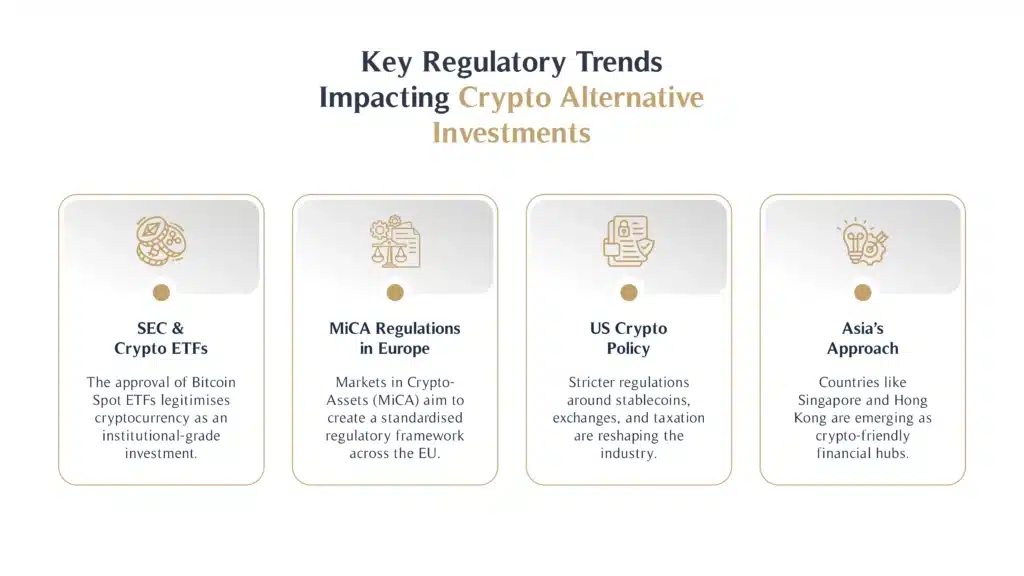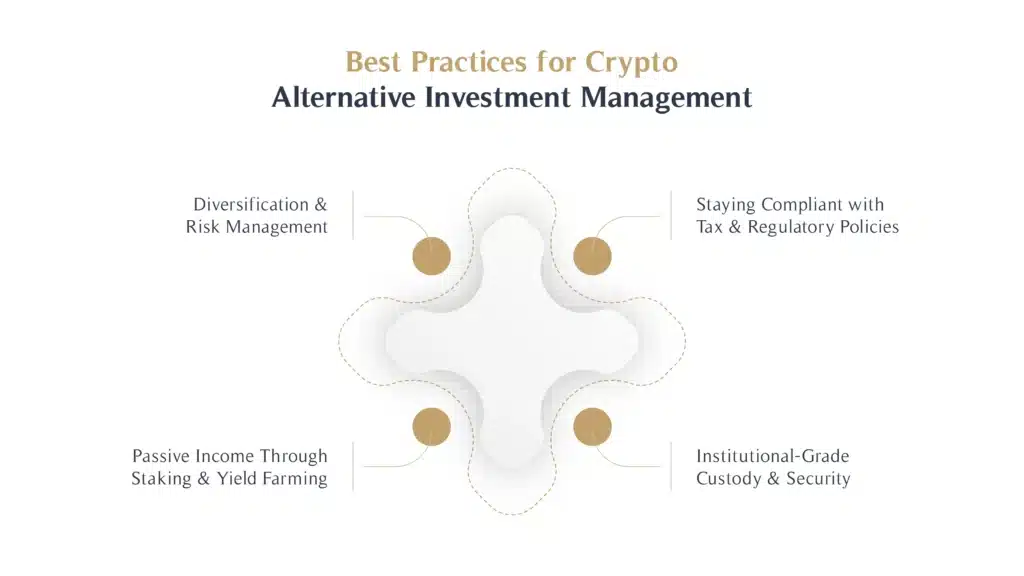Cryptocurrency has evolved significantly over the past decade, transforming from a high-risk speculative asset into a recognised crypto alternative investment category. What was once dismissed as a bubble is now considered a viable long-term investment by institutional investors, hedge funds, and high-net-worth individuals (HNWIs).
As traditional investment portfolios face increasing volatility due to macroeconomic uncertainties, investors are exploring alternative investments in crypto to hedge against inflation, diversify their portfolios, and gain exposure to blockchain-driven financial innovations.
However, the regulatory landscape, risk management strategies, and institutional adoption are key factors shaping crypto’s future as a long-term investment option.
The Growing Acceptance of Crypto as an Alternative Investment
Crypto vs Traditional Alternative Investments
Alternative investments, which traditionally include real estate, private equity, commodities, and hedge funds, have long been favoured by institutional investors seeking uncorrelated assets. Crypto alternative investment now sits alongside these asset classes, offering:
- Low correlation to traditional markets (stocks, bonds)
- Decentralisation and financial sovereignty for investors
- High growth potential with innovation in blockchain, DeFi, and Web3
- Hedge against inflation similar to gold and other tangible assets
As Bitcoin, Ethereum, and other cryptocurrencies mature, they are increasingly integrated into wealth management strategies, institutional portfolios, and crypto alternative investment management firms.
The Role of Regulations in Long-Term Crypto Investment
Regulatory developments are pivotal in defining the future of alternative investments in crypto. Governments worldwide are establishing frameworks to ensure investor protection while fostering innovation.
Key Regulatory Trends Impacting Crypto Alternative Investments
- SEC & Crypto ETFs: The approval of Bitcoin Spot ETFs legitimises cryptocurrency as an institutional-grade investment.
- MiCA Regulations in Europe: Markets in Crypto-Assets (MiCA) aim to create a standardised regulatory framework across the EU.
- US Crypto Policy: Stricter regulations around stablecoins, exchanges, and taxation are reshaping the industry.
- Asia’s Approach: Countries like Singapore and Hong Kong are emerging as crypto-friendly financial hubs.
How Regulations Impact Long-Term Investors
For crypto alternative investment management, clear regulations reduce uncertainty and improve investor confidence. Institutional-grade custody solutions, insured digital asset platforms, and tax-compliant frameworks are becoming essential components of long-term crypto investment strategies.
While some investors fear overregulation may stifle innovation, well-structured policies ultimately foster mass adoption and institutional participation, paving the way for sustainable growth in crypto alternative investment markets.
How High-Net-Worth Individuals (HNWIs) Are Investing in Crypto
The Institutionalisation of Crypto for Wealth Management
HNWIs and family offices are increasingly allocating capital to crypto alternative investment strategies, leveraging:
- Crypto hedge funds and venture capital investments in blockchain startups
- Staking and yield farming to earn passive income on digital assets
- Tokenised real-world assets (RWAs) to invest in real estate, art, and commodities
- Custodial solutions & private wealth management to ensure security and regulatory compliance
According to a report by Capgemini, nearly 70% of HNWIs under 40 are already invested in crypto or exploring allocation, signalling a generational shift toward digital assets.
Institutional Adoption of Crypto
- Fidelity Investments now offers crypto custody and trading for institutional investors.
- BlackRock launched a Bitcoin ETF, signaling confidence in crypto’s future.
- Dubai & Singapore are positioning themselves as global hubs for crypto wealth management.
These trends demonstrate that crypto alternative investment management is no longer a fringe movement but a mainstream financial strategy.
Crypto Investment Management Strategies for Long-Term Investors
Best Practices for Crypto Alternative Investment Management
For long-term investors looking to incorporate cryptocurrency into their portfolios, the following strategies are essential:
1. Diversification & Risk Management
- Allocate capital across Bitcoin (store of value), Ethereum (smart contracts), and emerging altcoins
- Invest in DeFi, NFTs, and Web3 projects for exposure to high-growth sectors
- Consider tokenised real-world assets (RWAs) for stability and risk mitigation
2. Passive Income Through Staking & Yield Farming
- Staking PoS cryptocurrencies like Ethereum, Solana, or Cardano for rewards
- Utilising DeFi lending platforms to generate passive income
- Participating in liquidity pools while managing impermanent loss risks
3. Institutional-Grade Custody & Security
- Use cold storage solutions (Ledger, Trezor) for long-term holdings
- Work with regulated custodians like Anchorage, BitGo, or Fidelity Digital Assets
- Implement multi-signature wallets for enhanced security
4. Staying Compliant with Tax & Regulatory Policies
- Track crypto transactions with tax software like CoinTracker or Koinly
- Leverage crypto-friendly jurisdictions for tax optimisation
- Consult legal and financial advisors for compliant investment strategies
The Future of Crypto as a Long-Term Alternative Investment
Key Factors Shaping the Future
- Bitcoin as a reserve asset: Institutional adoption suggests Bitcoin could rival gold.
- Ethereum & DeFi expansion: Smart contract ecosystems will revolutionise finance.
- Tokenised assets & real-world integration: The rise of RWAs and stablecoins will drive mainstream adoption.
- Regulatory clarity: Clearer guidelines will attract more institutional investors.
Conclusion
At MHG Wealth, we specialise in helping clients navigate the evolving world of crypto alternative investments, offering tailored strategies designed to align with their long-term financial objectives. As cryptocurrency continues to gain recognition as a viable asset class, our expertise ensures that investors can capitalise on its potential while effectively managing risks. From institutional-grade custody solutions and portfolio diversification to staking, tokenised assets, and blockchain-driven investment opportunities, we provide the knowledge and tools needed to make informed decisions.
With a deep understanding of market trends, regulatory developments, and wealth management best practices, our team is committed to guiding you through the complexities of digital assets and alternative investments. Connect with us today to discover how integrating cryptocurrency and other alternative investment options can enhance your portfolio and position you for sustainable financial growth.
Is crypto considered an alternative investment?
Yes, cryptocurrencies are categorised as alternative investments due to their decentralised nature and high-growth potential, similar to commodities and private equity.
How do regulations impact long-term crypto investments?
Regulations provide investor protection, reduce fraud risks, and encourage institutional adoption, making crypto a safer long-term investment.
What role do HNWIs play in crypto alternative investment?
HNWIs are diversifying portfolios with Bitcoin, Ethereum, DeFi, and tokenised assets, often using professional crypto wealth management services.
How can I manage my crypto investments for long-term success?
Diversification, staking, secure custody, regulatory compliance, and strategic risk management are essential for long-term crypto investment success.
What are the risks of investing in crypto as an alternative asset?
Volatility, regulatory uncertainty, cybersecurity threats, and market manipulation are key risks, but they can be mitigated with proper risk management strategies.








